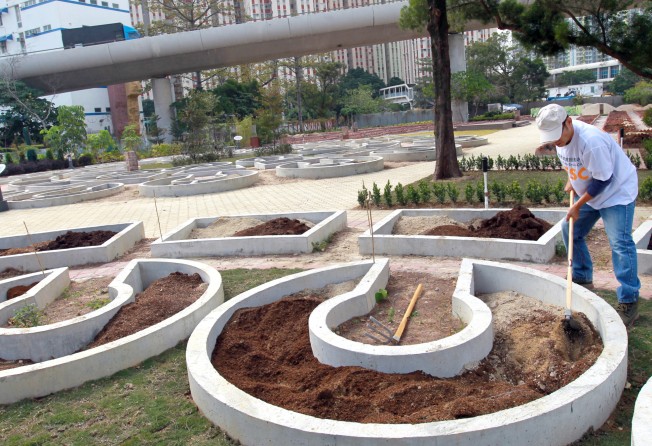Large urban farm in east Kowloon set to open in March

The community can expect to reap what they sow in a new, 750,000-square-foot urban farm starting from March.
The “Urban Oasis” in Ngau Tau Kok aims to combine greenery and community participation through farming on accessible urban spaces, says Christian Family Service Centre, a social welfare group which runs the site.
“Urban farming is popular in other countries. It is a good way for families, the elderly and retirees to relax,” said Kitty Chau Shuk-king, a programme director with the centre. “There are already too many buildings in the area. As such, it is important to have open green spaces.”
The project is phase 2 of a wider communual greenery scheme which commenced in 2010. Located on an open space under a matrix of busy flyovers near Ping Shek Estate and Richland Gardens, the site has 350 nursery planters over a 45,000-sq-ft plot.
Fifty of the planters are reserved for the elderly, socially-deprived and people with special-needs, while the remaining is open to public rental at HK$300 a month for a minimum period of six months. There will also be raised planters and barrier-free environments to cater for the need of wheelchair users.
The “city farmers” can plant five seasonal produce including broccoli, carrots and tomatoes in one of the thirty-sq-ft planters in key-hole and curved shapes. Hand tools, water and fertilisers, as well as training courses will be provided to participants on site. The agency says farmers can expect up to two harvests in half a year.
However, the centre has to finish procedures for obtaining water supply and renew a short term land lease with the government before the farm can come into full operation.
The centre said it lodged an application for water supplies with the Water Supplies Department two years ago but has yet to get a formal response.
“The application has taken two years. I understand there are a lot of government procedures involved,” said Chau. “We hope we can get the approval in time for the scheduled opening in March so that the community can enjoy urban farming.”
The department later told the Post that the site would have water supply before the Lunar New Year. Senior Engineer at WSD’s public relations unit, Wong Man-kei said: “The paper-work of the submission has been completed and is satisfactory. All that is left is the connection between the public mains and the supply mains within the lot boundary.”
The centre was granted to use the site by the Lands Department in July 2010 under a three-year lease, subject to renewal. It paid a nominal HK$1 rent to the government, a common concession provided to non-profit community groups. The lease expired in July 2013.
“We have yet to renew the lease. But so far we have been getting positive messages from the Lands Department to continue running the farm,” Chau said. “The Lands Department also said that we will be given at least a season-long notice if we were to hand back the land.”
A Development Bureau spokeswoman said it was common practice to allocate temporary vacant lands to set up plant nurseries under short-term leases. Upon expiry, the site use will be reviewed on a seasonable basis.
Phase 1 of the project, “Serene Oasis”, was opened in May 2013. It provides horticultural therapy, which includes communal planting and learning activities for people suffering from dementia and depression. The centre has also reserved a 20,000 square-feet plot for phase 3 of the project.